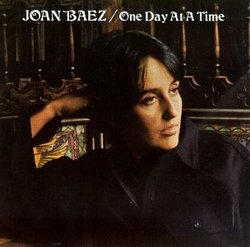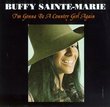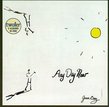| All Artists: Joan Baez Title: One Day at a Time Members Wishing: 2 Total Copies: 0 Label: Vanguard Records Release Date: 2/13/1996 Genres: Folk, Jazz, Pop, Rock Styles: Traditional Folk, Contemporary Folk, Swing Jazz, Singer-Songwriters, Folk Rock Number of Discs: 1 SwapaCD Credits: 1 UPCs: 015707931021, 415707931029, 015707931045, 090204503124 |
Search - Joan Baez :: One Day at a Time
 | Joan Baez One Day at a Time Genres: Folk, Jazz, Pop, Rock
|
Larger Image |
CD DetailsSimilar CDs
Similarly Requested CDs
|
CD ReviewsPersonal, political and moving 11/20/1998 (5 out of 5 stars) "ONE DAY AT A TIME is perhaps Joan Baez' most personal album (even though she only wrote two of its eleven songs), and definitely her most moving. Twenty-eight, pregnant, and with her husband, David Harris, having just begun a three-year prison sentence for refusing the draft, Joan could have withdrawn, recoiled from the spotlight to have her child in private; instead, she did what she's always done, namely, tried to bring a little beauty to some very ugly times. Recorded in Nashville (in honor of Harris who was a country music fan) in the fall of 1969, the album's relaxed country flavor provided a terrific backdrop for Joan's stately vocals, and though her songwriting hadn't yet blossomed, she contribute two compositions to the album, the lovely "Sweet Sir Galahad", which she still continues to perform in concert, and her heartfelt "Song for David". The rest of the material included work by Gil Turner, the Rolling Stones, Marijon Wilkin and Willie Nelson. Part of the beauty of this album lies in its timelessness. While much Vietnam-era "protest music" needs to be listened to in context to be appreciated, ONE DAY AT A TIME -- indeed, as with most of Joan's work -- expresses concerns and feelings that are universal, making it approachable nearly three decades later." A time capsule from Joan's dark days. Margot D. Fernandez | Tucson, Arizona | 09/07/1998 (5 out of 5 stars) "Those who remember the brave attempts to change the world that took place in the Sixties can relate to this particular album. Joan Baez had married, and her husband, David Harris, a political activist, was in prison for refusing the draft. Joan had his baby while he was in jail, and this album reflects her quiet fears, both for him and for herself. It didn't look very much like the world was changing at that particular time in Joan's life, although time would vindicate some of her and David's struggles. But in this collection, which has a decidedly country flavor in deference to Harris' preference for country music, Joan becomes Everywoman, fearing for her man and waiting for his return. In particular, her haunting performance of "One Day at a Time" reaches out to the lonely and anxious part of all of us. Joan also could hardly have avoided hearing the complaints that she was becoming passe, that the peace movement was floundering, that pacifism was being abandoned in favor of more aggressive means. Her album makes a lonely statement that is a very specific portrait of an artist staying true to her beliefs, for whatever they are worth. Her future involvement with Amnesty International was far away at this time, and she was surely facing the future with a need for direction. In this album she was willing to share her doubts and pain. She gave us a great gift, a very personal revelation, and a courageous statement of faith. This album is inspiring." One of the Great albums from the early 70s R. Craig | L.A. | 03/10/2006 (5 out of 5 stars) "This was a cassette I wore out just listening to in my car circa 1970. Before the Eagles and other Country-Rock groups were making music history Joan was paving the way for many groups that came after with this fine set of songs. Using some of the best studio players in Nashville she crafted a masterpiece that still stands the test of time. I ordered the CD to replace the worn out cassette and I plan on listening to it again and again just as I had 35 years ago. Timeless...."
|

 Track Listings (11) - Disc #1
Track Listings (11) - Disc #1






